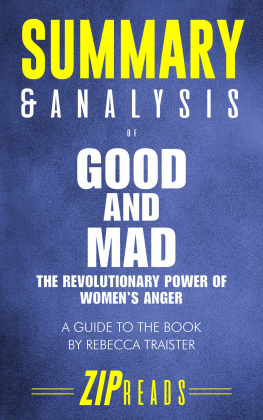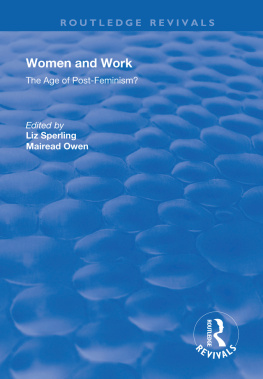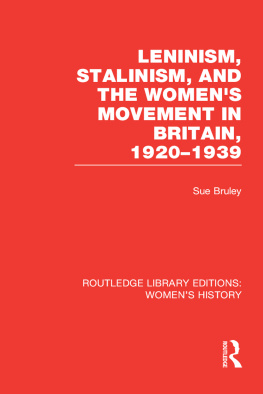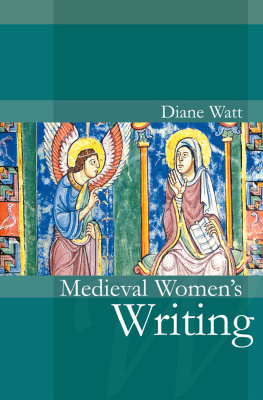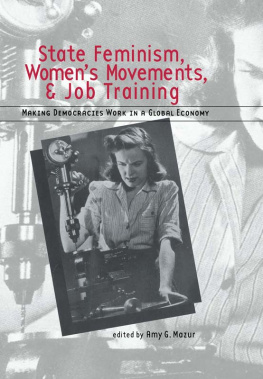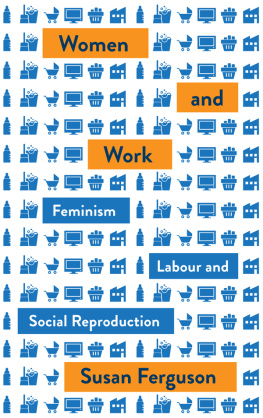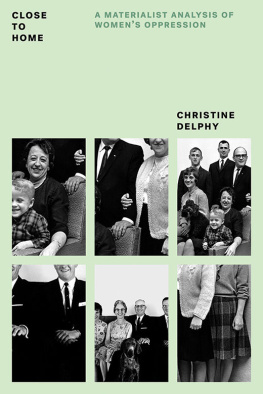ROUTLEDGE LIBRARY EDITIONS:
FEMINIST THEORY
FEMINISM AND MATERIALISM
FEMINISM AND MATERIALISM
Women and Modes of Production
Edited by
ANNETTE KUHN AND
ANNMARIE WOLPE
Volume 7
First published in 1978
This edition first published in 2013
by Routledge
2 Park Square, Milton Park, Abingdon, Oxon, OX14 4RN
Simultaneously published in the USA and Canada
by Routledge
711 Third Avenue, New York, NY 10017
Routledge is an imprint of the Taylor & Francis Group, an informa business
1978 Routledge & Kegan Paul
All rights reserved. No part of this book may be reprinted or reproduced or utilised in any form or by any electronic, mechanical, or other means, now known or hereafter invented, including photocopying and recording, or in any information storage or retrieval system, without permission in writing from the publishers.
Trademark notice: Product or corporate names may be trademarks or registered trademarks, and are used only for identification and explanation without intent to infringe.
British Library Cataloguing in Publication Data
A catalogue record for this book is available from the British Library
ISBN: 978-0-415-53401-7 (Set)
eISBN: 978-0-203-08796-1 (Set)
ISBN: 978-0-415-63505-9 (Volume 7)
eISBN: 978-0-203-09408-2 (Volume 7)
Publisher's Note
The publisher has gone to great lengths to ensure the quality of this reprint but points out that some imperfections in the original copies may be apparent.
Disclaimer
The publisher has made every effort to trace copyright holders and would welcome correspondence from those they have been unable to trace.
Feminism
and Materialism
Feminism
and Materialism
Women and
Modes of Production
Edited by
Annette Kuhn
and
AnnMarie Wolpe
First published in 1978
by Routledge & Kegan Paul Ltd
39 Store Street,
London WC1E 7DD,
Broadway House,
Newtown Road,
Henley-on-Thames,
Oxon RG9 1EN and
9 Park Street,
Boston, Mass. 02108, USA
Set by Hope Services, Wantage
and printed in Great Britain by
Lowe & Brydone, Thetford, Norfolk
Routledge & Kegan Paul 1978
No part of this book may be reproduced in
any form without permission from the
publisher, except for the quotation of brief
passages in criticism
British Library Cataloguing in Publication Data
Feminism and materialism.
1. Women Social conditions
I. Kuhn, Annette II. Wolpe, AnnMarie
301.412 HQ1154 7840670
ISBN O 7100 0072 3
ISBN O 7100 0074 X Pbk
Contents
4 Church, state, and family: the women's movement
in Italy
6 Modes of appropriation and the sexual division of
labour: a case study from Oaxaca, Mexico
7 Women and production: a critical analysis of some
sociological theories of women's work
Preface
The way in which this reader came to be produced and the rationale for its production are outlined by us in our introductory paper. As far as the main body of the book is concerned, readers will undoubtedly become aware that many of the contributors have felt the need to give a critical appraisal of the current state of work in their particular fields of interest before embarking on their own analyses. The prevalence of this strategy indicates the extent to which a move into new areas of work and forms of theorizing involves a necessary, and often a very difficult, break with the problematics which inform much of the existing work in the areas drawn on. The order in which the contributions are presented here has its logic in the two main themes which emerge constantly throughout the book the family and the labour process. The recurrent concern with these issues is a demonstration of their centrality with regard to the position of women in society, and suggests that an understanding of the precise character of the position of women is necessarily based on an analysis of the operation of the structures of family and labour process; and more than that, as we indicate in our introductory paper, these structures are to be understood in their historical concreteness.
It will also be apparent that there are a number of concepts which reappear throughout the book patriarchy, ideology, value, and so on, concepts which even if only in their repetition may be seen as giving some indication of their importance for the project of this book. This is not to suggest, however, that they have always been fully worked out or developed in the contexts in which they are mobilized: it is perhaps not yet the moment for that. They may, though, be taken as guidelines for the future work which obviously needs to be, and will be, conducted in the construction of a feminist theory; we have offered some suggestions as to the specific concerns of such future work in the brief introduction which precedes each of the papers. Nor are the various contributions uniform in their approach to the construction of such a body of theory: it might be argued, for instance, that some inscribe forms of determinism not present in others. Whatever the absences in or inadequacies of particular contributions, however, it is nevertheless hoped that the individual papers and the book as a whole will stimulate discussion and provide a focus both for ongoing work and for work which will be undertaken in the future.
We would like to acknowledge here the work done by the contributors to the book, who have worked together to a considerable extent in its production. Tribute must also be paid by both editors and contributors to the work of the secretaries who dealt with the manuscript: Daphne Clench and Shirley Webb in particular ensured, under conditions of their usual overwork, that the typescript was ready in time to meet our deadline. Christine Pearce gave indispensable last-minute support and assistance, and many other feminist friends, notably Mary McIntosh, offered the practical and intellectual support which women so often need in order to deal with their many and varied responsibilities: this, in many ways, is what the book is all about.
London
November 1977 | Annette Kuhn
AnnMarie Wolpe |
Notes on contributors
VERONICA BEECHEY is a lecturer in sociology at Warwick University. She has previously done a variety of work in education, including teaching retarded children, teaching on adult education and women's studies programmes in the USA, and shop steward education in Britain. She is actively involved in the women's movement.
LESLEY CALDWELL trained as a teacher and studied literature in her birthplace, Australia, before coming to Britain where she has done teaching of various kinds, and read for a degree in sociology at Manchester University. She is currently living in London and working on a thesis on The Family and Church in Italy at the Institute of Education. She has two children.



